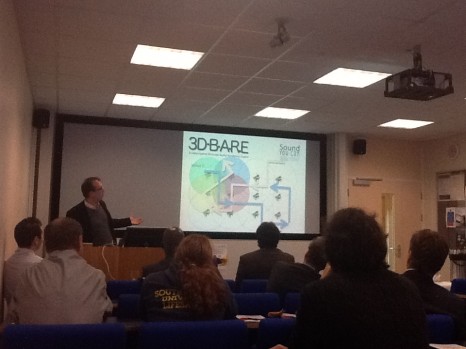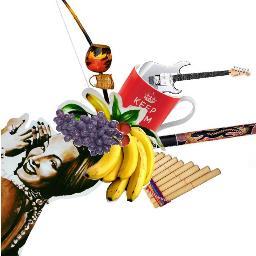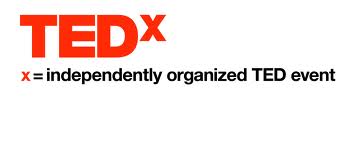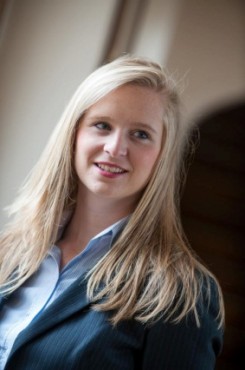Blog
 Walk inside a piece of music via the 3D Binaural Audio Rendering Engine
14.10.2013
Walk inside a piece of music via the 3D Binaural Audio Rendering Engine
14.10.2013
DE Lunch-time seminar presented by Ben Mawson
‘Walk inside a piece of music via the 3D Binaural Audio Rendering Engine’
My hunt for ‘realistic’, immersive experience of digital audio has led to development work towards 3DBARE, the 3D Binaural Audio Rendering Engine.
 A means for multiple users to ‘walk inside a piece of music’, as though the sounds were actually emanating from points in a physical space, 3DBARE is an exercise in ‘digital liveness’, making repeated experience of fixed output continually changeable.
A means for multiple users to ‘walk inside a piece of music’, as though the sounds were actually emanating from points in a physical space, 3DBARE is an exercise in ‘digital liveness’, making repeated experience of fixed output continually changeable.
During this long process of discovery and experimentation, I have worked extensively with an earlier tool called noTours, using GPS to edit a landscape with sound.
I will outline some of the technical challenges in building 3DBARE and the musical compositions using space as an expressive layer which I have developed over the past two years, during my PhD research.
These include the ongoing ‘Audio Portrait of a City‘, spread across Southampton’s green spaces and the early stage project ‘Listening for Infection‘ (a proposed collaboration between Music and the Faculty of Medicine), exploring biomedicine through sonic gamification.
DE Lunch-time seminars are free to attend and lunch will be provided. All are welcome.
More information:
Website: http://www.benmawson.com/
3DBARE Blog Multidisciplinary Research Week.
A sample lecture of ‘3DBARE and Music You Can Walk Inside’
 The Web and the Songlines of the Global Village
19.06.2013
The Web and the Songlines of the Global Village
19.06.2013
DE Lunch-time seminar presented by Ronise Nepomuceno
‘The Web and the Songlines of the Global Village’
The latest report from the IFPI (International Federation of Phonographic Industry) on Digital Music, clearly states that Digital Music is driving the web economy. This new economy is now shifting the dominance of USA and UK on the music market, with artists from places such as Brazil and South Korea reaching the IFPI global charts of top selling singles. No wonder the music industry is now, more than ever going Global. World Music which was once seen as a niche category for ethnic and eccentric tastes, is now the new rock-in-roll.
News on the decline of the traditional music industry now sound naïve, as the same medium responsible for the biggest decline in the industry, since the late 90s, is now responsible for its recovery. In 2012, the music industry achieved its best year performance since 1998 with a growth of 81% in total. While sales on CDs fell by 10%, 27% of the sales were digital. Contrary to the tendency of getting everything for free, people are now paying for downloading music.
 This new shift, together with the use of the web to distribute and promote new work, has been driving the web economy not only in terms of technology, but also in ways that independent musicians are organising themselves and using the medium. It is also changing the way we relate to music since the 80s, the decade in which commercial music from United States and UK had a high dominance in the world. Music on the web is creating new soundscapes in a way similar to the songlines of Aboriginal Australians. These new connections are reinforcing Marshall McLuhan’s theories about the Global Village, a concept that was explored 40 years before the birth of the World Wide Web.
This new shift, together with the use of the web to distribute and promote new work, has been driving the web economy not only in terms of technology, but also in ways that independent musicians are organising themselves and using the medium. It is also changing the way we relate to music since the 80s, the decade in which commercial music from United States and UK had a high dominance in the world. Music on the web is creating new soundscapes in a way similar to the songlines of Aboriginal Australians. These new connections are reinforcing Marshall McLuhan’s theories about the Global Village, a concept that was explored 40 years before the birth of the World Wide Web.
This a very broad subject, and as a starting point, this talk will focus on highlighting locations with a strong dominance of Independent Music and their strategies on the use of the web for the production and distribution of music. We will also discuss the effect this has on other creative areas and the way the relationship of the public with music is changing.
 Ronise is currently a Web Developer in iSolutions. She is originally from Minas Gerais, in Brazil, a place with strong roots in Independent Music. Ronise has been using the web since 1994, as an Environmental Journalist and while volunteering for Environmental Organisations such as Greenpeace Communications and Women’s Environmental Network. She also produced her first Online Magazine on Environmental and Development Education in 1995. She is currently carrying research under her own initiative into the dominance of music on the web – you can read more on her blog www.berimbaudrum.org
Ronise is currently a Web Developer in iSolutions. She is originally from Minas Gerais, in Brazil, a place with strong roots in Independent Music. Ronise has been using the web since 1994, as an Environmental Journalist and while volunteering for Environmental Organisations such as Greenpeace Communications and Women’s Environmental Network. She also produced her first Online Magazine on Environmental and Development Education in 1995. She is currently carrying research under her own initiative into the dominance of music on the web – you can read more on her blog www.berimbaudrum.org
DE Lunch-time seminars are free to attend and lunch will be provided. All are welcome.
Next DE Lunch Seminar: Ben Mawson ‘walk inside a piece of music’ via the 3D Binaural Audio Rendering Engine, 22nd July 2013.
Changing the Learning Landscape #cll1213
![]() May 16, 2013
May 16, 2013
by Lisa Harris
Yesterday Fiona Harvey, Graeme Earl and myself headed for London Town to present at the HEA Changing the Learning Landscape event.
This event offered an opportunity for those involved in teaching to find out more about the role that social media can play in enhancing the student and tutor experience. It was therefore a chance for us to wax lyrical about digital literacy, digichamps, cool social media tools and of course MOOCs :-)
Fiona’s review of the day is here on the CITE blog
Multidisciplinary Research Week 2013- Success
May 9, 2013
by Alison Simmance
The University of Southampton sprang to life during the 17-22nd March when over 1050 attendees joined us for the 3rd annual Multidisciplinary Research Week.
This year’s week long celebration was built on the best cross-disciplinary science and arts from the University of Southampton’s staff and students with a packed programme of talks, hands-on science demonstrations, exhibitions, debates and a film screening. We were also joined by key external speakers who brought insights into policy applications and cutting edge research in relation to our University Strategic Research Groups.
See the full programme here. The energy and intellectual alchemy of the week certainly inspired ‘ideas worth spreading’ and far exceeded our expectations. Thank you to all our speakers, demonstrators, supporters, volunteers, digital champions, sponsors and attendees for enabling this annual cross-disciplinary event at the University of Southampton to be a huge success.
The week in numbers– see the statistics from MDR Week 2013 below or in the MDRWeek 2013 Final Statistics Flyer.
Blog posts about all our events at #MDRWeek will be coming shortly! Watch this site for news.
Did you miss MDR week 2013?
See all our multimedia outputs online now!
- Full webcasts (videos of all talks).
- Interviews and on the floor views (by ICM Reporting).
- YouTube #MDRWeek (all interviews and videos).
- Blogs from the week.
- See all the power point presentations on slideshare.
- In pictures on pinterest.
Did you miss TEDxSouthamptonUniversity 2013?
- All videos now on YouTube (TedxSotonUni).
- In pictures (Flickr).
- Website for full details.
MDR Week 2013 STATISTICS-
- 23 events (incl. 2 exhibitions and 1 interactive art session) from 17-22nd March 2013.
- 1057 actual attendees (approx. 10% external).
- First TEDx at the University of Southampton- tickets sold out; new website; IBM sponsorship; 15 speakers; >1000 hits so far on YouTube.
- Prof Mohan Munasinghe– Vice Chair of IPPC/Nobel Prize Winner 2007 (BBC Radio Solent Broadcast & future collaborations).
- First formal celebration of the World Water Day 2013 (150 attendees).
- >70 people attended the ‘Litmus Project: Science & Poetry Exhibition’.
- >120 people attended ‘Question Time: The Brain & Society’, (incl. 40 6th Formers)
- 15 people created an eco-friendly bag from 60th Anniversary campaign banner material at ‘Be a Green Shopper’.
- Collaborations: UoS Science & Engineering Festival, WSA, WUN, IBM, Google, Marwell Wildlife, three 6th Form Colleges.
First year that social media was used!
- 11 blogs (>300 hits in the 1st week);
- 26 interviews– >500 hits so far on YouTube;
- 17 webcasts from all talks;
- Tedx 15 Videos– >1000 hits so far on YouTube.
- >370 hits to the multidisciplinary website;
- >630 tweets #MDRWeek;
- 3 storifys;
- 3 pinterests.
MDR Week 2014- Your Views
We are now already planning next year’s research week and welcome any suggestions for a possible theme on this. If you have an interesting cross-disciplinary project/initiative or idea and/or wish to get involved in other ways then please contact us: multidisciplinary@soton.ac.uk
Full details available at: www.southampton.ac.uk/multidisciplinary
Share your experience with us on Twitter #MDRWeek @Multisoton
#Digichamp Flo Broderick on learning to be a Reporter
![]() April 26, 2013
April 26, 2013
by Lisa Harris
Only a month ago I spent my Monday morning at university attending a Digichamps workshop on creating and editing video on smartphones with David Willox and Simon Morice of icmReporting. After learning about conducting video interviews, we exchanged contact details and a month later I found myself working as a news reporter at Digital Media Europe 2013, a conference organized by WAN-IFRAon digital trends within the media industry.
Given that I had absolutely no experience in reporting, I was somewhat surprised when Simon and David sent me off to interview business leaders with a smartphone, an ALM, a microphone and lights on the first morning of the conference. However, their simple four question approach and their refreshing confidence in a student’s maturity and capabilities enabled me to conduct 11 video interviews over the three days at 200 Aldersgate in London.
As a digital marketer, I’ve come to value the importance of instantaneous coverage and with the help of the iPhone app, Voddio, I found myself conducting an interview, gathering some B-Roll (video lingo for extra footage), editing the piece and uploading it to YouTube in about 30 minutes.
In order to interview effectively, I was encouraged to listen to all of the presentations some of which focused on themes such as paid-content strategies, digital advertising growth and open data. My highlights included Matt Gierhart’s (Global Head of Social at Ogilvy Action) insightful presentation on “Stories from the Frontline of Consumerism” and hearing from Andy Wiedlin, Chief Revenue Officer at BuzzFeed who spoke about monetization on their social news platform. Impressed by my smartphone interviews, Simon and David threw me into the deep end asking me to present the conference’s live stream channel interviewing Gierhart. No second takes, no second chances:
I might be set on a career in digital marketing in the technology sector, however, having the experience as a reporter reminded me that there are other fields I am interested in and that exploring as many sectors as possible whilst you are still in education can be exceptionally useful and rewarding going forwards. I may even be lucky enough to work at the next WAN-IFRA conference in June in Bangkok (Digital Media Asia 2013). If any other Digichamps or students are interested in working with icmReporting then please email flo.broderick@gmail.com
To see my interviews at #DME13 please check out the icmReporting YouTube channel here.
The 2013 Digital Literacies Conference #sotonMOOC
![]() April 25, 2013
April 25, 2013
by Lisa Harris
Written by @garethpbeeston and first published on the #digichamps blog:
The #SotonMOOC conference held today was host to a number of prestigious people from UK businesses and Universities, hoping to debate the challenges involved with building, moderating and launching a MOOC.
The event was kicked off by our very own @HughDavis who spoke about the projects in which @CITESoton is involved with across the University and how we can develop online education to cater to the digital arena. Following this, presentations from @CMSinclair, from Edinburgh University, and @Sheilmcn, from CETIS, gave their thoughts on how MOOCs should be developed and to what extent these challenges play a part in the MOOCs that they each have been involved with.
Many famous faces of the MOOC world enjoyed their well-earned coffee break as they recessed for pastries and hot drinks, provided by the University of Southampton catering department. Lovely grub!
To recommence the event, the #Digichamps, @GarethPBeeston and @RenaldoBLive, took to the floor providing a #DrawMyLife video on how the Digichamps came to be and how they can help staff around the University to become more digitally literate. Following on from this were two amazing sessions which focused on various projects around the University that are involved with digital literacies and the use of Web tools for an engaging and enthralling experience online.
A session on “Cool Social Media Tools” was conducted after the presentations that showed us how plugins on @Wordpress can provide an increase in functionality and interactivity on various sites involved with research, education and business. @katieonthetweet, another #Digichamp, also presented an inspiring presentation on an app that allows for the coordination of class recordings, richer media, timetables, notes and support for students at University.
The mixture of cool social tools carefully led onto a session conducted by Prof. @mweller from the Open University. This presentation was streamed online via a Google Hangout, showing practically the extent of the use of Web tools within education. This fantastic presentation inspired many around the room giving a great insight into the running of #H8170Open and Open Educational Resources through MOOCs.
After the lunch break, many delegates took part in a break-out session where various people would debate on the certain challenges, strengths and affordances involved with the creation, development, maintenance and distribution of content and MOOCs themselves. These included using video for further engaging tools, staying safe online and awesome apps in the classroom.
A final presentation to close the event was performed by Mark Lester, who is currently the Head of Strategy & Development at the Open University and a member of the Executive Team @FutureLearn (an initiative to drive open learning on the Web).
Many of the delegates were engaged, inspired and satisfied with an all-round successful event organised by our very own @LisaHarris and @FionaJHarvey. Many thanks to the digichamps, video teams and all delegates were announced to close the event. We wish everybody every success in creating their online learning tools and courses in the future.
Digital Economy Success Stories
![]() April 22, 2013
April 22, 2013
by Lorraine Warren
Readers of this blog might be interested in some of the activities going on at the Centre for Strategic Innovation which has really bedded in since our launch in November 2011. I wanted the CSI, in the spirit of innovation, to be a bit disruptive – my vision was, recognition for top-quality research, externally and internally, but also, to be experimental, to reach out and be interdisciplinary, and to connect with industry on leading edge knowledge exchange. I also wanted the ethos to be open to new suggestions, accessible, bottom-up and fun.
Anyway we’ve had a good start, particularly gaining new research recognition internally and externally in the EPRSC/Digital Economy/New Economic models strand. For example, I just obtained a 3K literature review grant, “Digital Disruption of the Value Creation Ecosystem– How new business models emerge”. This extends my earlier work as part of Creator which was again funded by the EPSRC and addressed business models in the digital domain.
But more importantly, there’s news of a significant £780,000 EPSRC research grant award to Prof. mc Schraefel of ECS and our own Dr. Stephen Rhys Thomas, leading a multidisciplinary team from Southampton drawn from ECS, Management and Economics. The successful bid was in response to an EPSRC Digital Economy call for New Economic Models. Congratulations to all concerned!
This EPSRC/DE/NEMODE research strand (value creation, lean/agile business models, underlying processes) has been complemented with a seminar series, Temporality and value at the intersection of arts and technology: advancing theoretical and methodological development and two collaborative events with ECS and the Digital Economy USRG (thanks to Lisa and Graeme), SXSC1and 2 that have brought in 00s of people from across the university, region, and industry, exciting interest as a rapid-platform for knowledge exchange, future research collaborations, especially in ECS, and also, check out the link to see the fun part, some great vids here.
As well as that strand, there are many, many other areas of interest, publications, grants, developments and initiatives I could have included here – this is just to give a flavour. Again with ECS we’re hosting an IET-sponsored Raspberry Pi event on April 25 (sold out), and a lunch meeting with Qinetiq in May. I’ll be organising a lunch meeting down the line to discuss these developments and future collaborations, so watch out for the date. So please do get in touch if there’s anything we can usefully collaborate on.
 The Elephant in the Room: When did data get so big?
03.06.2013
The Elephant in the Room: When did data get so big?
03.06.2013
Presented by Ian Brown, Projects Director, Web Science Trust.
The “Elephant in the Room” in this case is a huge and rapidly growing volume of fast-moving unstructured “stuff” generally known as “Big Data”.
– What is it?
– How do I recognise it when I see it?
– Should I be worried about?
– Is this a fad or should I be gearing up to know more?
This is an introductory talk (experts will have heard this all before) for those who are unsure about the definitions and relevance of the big data phenomenon in which we try to leave you a little clearer on what all the fuss is about, where to go if you want to get more detail and what might be next for Big Data.
Ian Brown is a 25 year veteran IT project manager, consultant now studying the Web Observatory at Southampton (you’ll need a separate ticket for that talk) and who also works as projects director for the international research charity the Web Science Trust.
 Open Data Developments
10.05.2013
Open Data Developments
10.05.2013
The University Open Data Service is now well established and starting to become part of our “Business as Usual”. Christopher Gutteridge and Ash Smith from ECS will talk about the new services, the problems encountered, and plans for the future including the recent launch of www.data.ac.uk
This event also provides an opportunity for extending the discussions at the last DE lunch about openness, copyright, social media policy etc.
#WebSci13 is just 3 weeks away…
![]() April 10, 2013
April 10, 2013
by Lisa Harris
It is not too late to book your place in Paris :-)
The Web demands new ways of working across traditional academic disciplines. Web Science builds skills and expertise in the technical underpinnings of the Web, the social processes that have shaped its evolution, and the impact of the Web on society. The presentations at #WebSci13 will address these contemporary issues across a wide range of applications from healthcare to cybersecurity.
While the deadlines for presenting have now passed, registrations from businesses, academics, policy makers and students who would like to attend the event are most welcome.
Some of the highlights you can expect at the Conference are:
Day 1 – Thursday 2nd May
Keynotes from Vint Cerf, co-inventor of TCP/IP and “Father of the Internet”, and Cory Doctorow, novelist, technology activist and co-editor of the popular weblog Boing Boing. There will also be paper presentations on a wide range of cutting edge Web Science projects, a lively Pecha Kucha session of short sharp talks and an evening Reception.
Day 2 – Friday 3rd May
A full day of poster sessions, papers and panels – followed by an evening banquet on the Seine.
Day 3 – Saturday 4th May
Debate how the web is revolutionising society, and the event concludes with a final selection of papers.
A draft programme is now available




